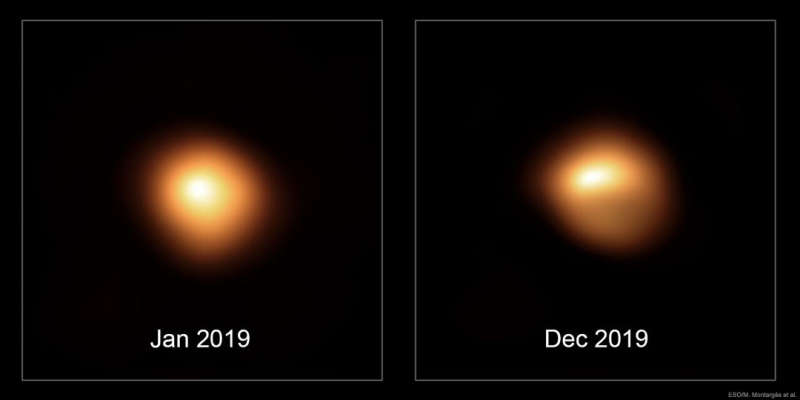Credit & Copyright: ESO, M. Montargcs et al.
Explanation:
Besides fading, is Betelgeuse changing its appearance?
Yes.
The famous red supergiant star in the
familiar constellation of Orion is
so large that telescopes
on Earth can actually resolve its surface -- although just barely.
The two
featured images
taken with the
European Southern Observatory's
Very Large Telescope show how the
star's surface appeared during the beginning and end of last year.
The earlier image shows
Betelgeuse having a much more uniform brightness than
the later one, while the lower half of
Betelgeuse became significantly dimmer than the top.
Now during the first five months of 2019
amateur observations show Betelgeuse actually got slightly brighter,
while in the last five months the star dimmed dramatically.
Such variability is likely just
normal behavior for this famously variable
supergiant,
but the recent dimming has rekindled discussion on how long it may be before
Betelgeuse
does go
supernova.
Since
Betelgeuse is about 700
light years away, its
eventual supernova -- probably thousands of years in the future --
will likely be an
amazing night-sky spectacle, but will
not endanger life on
Earth.
1999 2000 2001 2002 2003 2004 2005 2006 2007 2008 2009 2010 2011 2012 2013 2014 2015 2016 2017 2018 2019 2020 2021 2022 2023 2024 2025 2026 |
Yanvar' Fevral' Mart Aprel' Mai Iyun' Iyul' Avgust Sentyabr' Oktyabr' Noyabr' Dekabr' |
NASA Web Site Statements, Warnings, and Disclaimers
NASA Official: Jay Norris. Specific rights apply.
A service of: LHEA at NASA / GSFC
& Michigan Tech. U.
|
Publikacii s klyuchevymi slovami:
Betelgeuse - Betel'geize
Publikacii so slovami: Betelgeuse - Betel'geize | |
Sm. takzhe:
Vse publikacii na tu zhe temu >> | |
